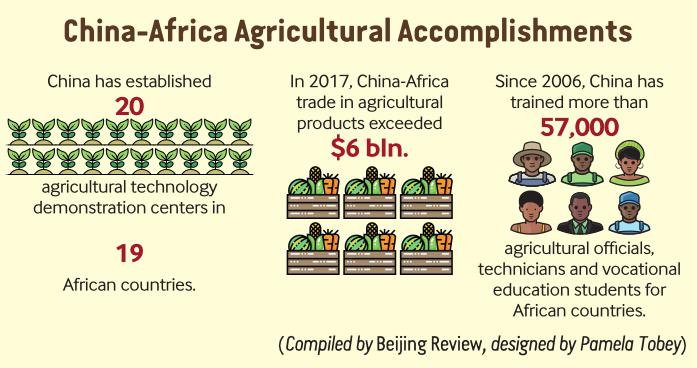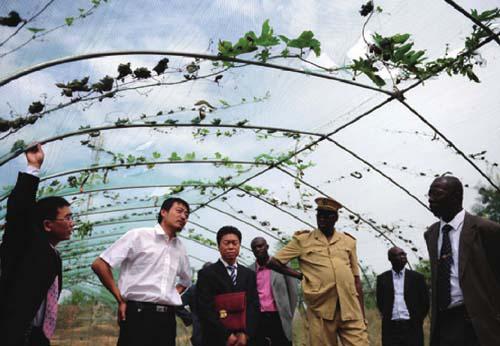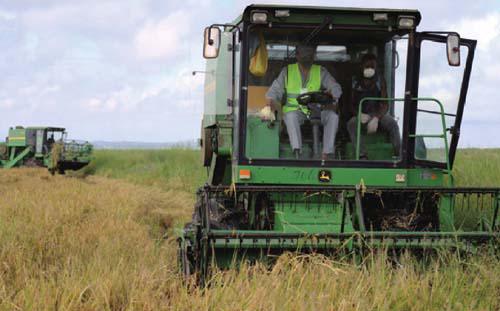GREATER FIELDS OF OPPORTUNITY
2018-10-18ByHanChangfu
By Han Changfu



Agriculture is a key area in ChinaAfrica cooperation and can benefit both sides. Since the first summit of the Forum on China-Africa Cooperation(FOCAC) in Beijing in 2006, China and African countries have been promoting agricultural cooperation. Thanks to the devoted efforts of Chinese and African leaders, greater achievements have been made in this cooperation over the past few years by implementing Chinese President Xi Jinpings initiative to create a China-Africa community with a shared future. This has elevated China-Africa agricultural cooperation to a new historic level. We will take the opportunity of this years FOCAC Beijing Summit to deepen bilateral collaboration in all areas and improve development quality.
Mutual benefits
Over the past 12 years, China and African countries have made outstanding achievements in advancing agricultural cooperation on a mutually beneficial and winwin basis.
The Chinese Government has been working with administrations of African countries under the principles of sincerity, real results, affinity and good faith, and following the approach of upholding justice and pursuing shared interests. Both sides have implemented the outcomes related to agricultural cooperation made at successive FOCAC summits in a comprehensive manner and launched exchanges and cooperation in all areas, including policy, technology, personnel training, trade and investment. While accelerating Africas agricultural modernization, ensuring its food security and increasing agricultural product varieties on the market, such efforts are essential to expanding the space for agricultural development in China and Africa and realizing mutually beneficial cooperation with win-win results.
Chinese and African governments have strengthened policy consultation on agricultural cooperation, with a focus on exchanges concerning Chinas experience and practices in agricultural and rural development and poverty reduction. In multilateral terms, China creates platforms for agricultural policy consultation with African countries by regularly holding meetings and inviting agricultural officials, experts and scholars from both sides to share their development concepts and practical experience. The efforts facilitate the alignment of Chinas five-year plans for rural economic and social development and agricultural modernization plans with Africas comprehensive agricultural development plans. They also enable China and African countries to learn from each other. In bilateral terms, China has signed memoranda of understanding or protocols with 16 African countries, covering various fields such as the seed industry, animal husbandry, agricultural machinery, inspection and quarantine. China has also established agricultural cooperation commissions or working groups with these countries to launch agricultural policy exchanges of various kinds and synergize their agricultural development strategies, laying a solid institutional foundation for win-win agricultural cooperation.
China attaches great importance to actively promoting agricultural technology exchanges with African countries. To date, it has established 20 agricultural technology demonstration centers in 19 African countries to showcase Chinas advanced agricultural products and technologies, build platforms for multilateral and bilateral technological cooperation and explore market-oriented and commercially sustainable operations. China has dispatched 724 agricultural experts, vocational education teachers and high-level consultants in 71 groups to 37 African countries to pass on their farming management expertise and help local farmers improve their comprehensive capacity in agricultural production. Based on the “10+10” partnership plan between Chinese and African agricultural research institutes, joint studies and research have been launched around new products, technologies and equipment suitable for Africas conditions. So far, China has launched trial growing of more than 300 agricultural products in various African countries and passed on more than 500 practical technologies to them, benefiting about 1 million farming households and providing important scientific and technological support and services to Africas agricultural development.
Thanks to their joint efforts, China and African countries have witnessed rapid growth in agricultural investment and trade in agricultural products. In 2017, China-Africa trade in agricultural products exceeded $6 billion, up 185.3 percent over 2006. Of this amount, China imported$2.94 billion worth of agricultural products from Africa such as oilseeds, cotton and linen fibers and beverages, an increase of 143 percent. The sound trading relation-ship has created favorable conditions for Chinese enterprises to invest in Africa. By the end of 2017, Chinese enterprises had invested in 117 agricultural projects, each with more than 5 million yuan ($732,000) of investment in Africa, covering more than two thirds of the countries on the continent with the investment stock totaling 14.83 billion yuan ($2.17 billion). The projects covered areas such as crop farming, agricultural produce processing and fishery. Sound and sustained development of economic and trading cooperation in agriculture has increased the supply of agricultural products on both Chinese and African markets, and promoted optimization of agricultural production capacity and transformation and upgrading of the farming sector in Africa.
Since 2006, agricultural personnel exchanges between China and African countries have become extensive. China has launched 337 training programs involving more than 57,000 agricultural officials, technicians and vocational education students from African countries. These programs have helped create a large talent pool for Africas agricultural development and fostered numerous friendship envoys, greatly enhancing mutual understanding and the traditional friendly relationship between Chinese and African peoples, thus consolidating the public support for cooperation in agriculture. China signed a letter of intent on South-South cooperation with the UN Food and Agriculture Organization (FAO) in 2006, becoming the first country to establish a South-South cooperation strategic alliance with the organization. It also established a trust fund to support South-South cooperation in agriculture. Since the fund went into effect in 2008, China has been cooperating with FAO to launch tripartite South-South cooperation projects in Africa and has held agricultural technology demonstration activities through more than 60 projects on the continent, gaining recognition from African governments and peoples and winning wide praise from the international community. The FAO director general has on many occasions spoken highly of Chinas leading role in South-South cooperation in agriculture.
Broad prospects
Through decades of development, China has been constantly improving the quality and benefit of agricultural development with distinctive features and outstanding advantages in aspects such as resource conditions, market demands and scientific and technological information. African countries, with urgent need of cooperation, have very high expectations of sharing Chinas achievements and experience in agricultural development.
Potential is huge for China and Africa to jointly cope with the global food crises and ensure food security, a major global concern that underlines the need for China and African countries to develop agriculture. Currently, agricultural development worldwide faces acute problems such as frequent climate disasters, aggravating resource constraints and escalating market fluctuations. Some African countries are frequently stricken by food crises. Enhancing the overall food production capacity and increasing food supply remain at the top of African countries agendas. Agricultural resources are scarce in China, the worlds most populous country. The Chinese Government attaches great importance to food security and has always given top priority to feeding more than 1.3 billion people in the country with adequate food.
In recent years, especially since the 18th National Congress of the Communist Party of China in 2012, China has implemented a strategy that calls for improving the usage of cultivated land and making better use of technology in grain production to achieve higher yields and has adopted more pro-agricultural policies. The enthusiasm of governments at various levels to prioritize agriculture and grain production and that of farmers engaged in grain production are important parts of this process. Chinas grain output has exceeded 600 billion kg for five years in a row. China has fed more than 20 percent of the worlds population with less than 10 percent of its farmland and around 6.5 percent of its fresh water resources, making a significant contribution to global food security and offering a point of reference for Africa. While collaborating with African countries, China will continue to give prominence to helping improve their overall grain production capacity. It stands ready to join hands with African countries to reduce hunger and malnutrition and ensure food security.
Potential is huge for China and Africa to jointly popularize new agricultural varieties, technology and equipment and boost agricultural innovation. Improved varieties, advanced technology and state-of-theart equipment are features of agricultural modernization. Since reform and opening up began 40 years ago, China has relied on innovation as the driving force for agricultural modernization. It has taken a range of measures to promote innovation based on imported technology and indigenous research results. In this process, it has accumulated extensive experience in the innovation and application of technologies. Today, almost all the main crops in China use high-quality seeds.

The overall mechanization rate in plowing, sowing and harvesting in China has exceeded 66 percent. Technological advancement contributes 57.5 percent to the countrys agricultural output growth. China has made breakthroughs in core technologies such as hybrid rice and corn and genetically modified insect-resistant cotton. It has developed more than 150 highly effective pesticides with low remnants and toxicity. With these achievements, China is able to provide diverse services for agricultural players of various types and sizes in Africa. They also pave the way for China and Africa to carry out joint research on agricultural varieties, technology and equipment, introduce new models for their application, and step up improvements in the quality and efficiency of agriculture and the transformation of this sector.
Potential is huge for China and Africa to jointly tap into their markets and resources and advance agricultural trade and investment. China has become the worlds largest consumer for agricultural products and a major source of outbound direct agricultural investment. The country is implementing a rural vitalization strategy, forging ahead with supply-side structural reform in the agricultural sector and pursuing high-quality development in agriculture, steps that will unleash new opportunities for agricultural cooperation with other countries. With the more discerning food demands of Chinas population, there is a rapidly growing need for high-quality and safe agricultural products.
China is set to import more agricultural products, providing a prospective market for African countries. In recent years, agriculture has exhibited remarkable signs of growth in Africa with an enormous demand for investment. Trade and investment cooperation between China and Africa can not only give Chinese investors access to a hotbed of investment, but also help raise farmers incomes in agricultural produce-exporting countries and investment recipient countries. African countriesadvantages in agricultural resources will therefore be translated into a boost for production capacity and development.
Action for a new era
Xis proposal on building a community with a shared future for mankind is gaining traction in the international community. The China-proposed Belt and Road Initiative is also receiving positive responses from an increasing number of countries. The comprehensive strategic partnership between China and Africa is at a historic high. In this context, the Ministry of Agriculture and Rural Affairs, in keeping with the principles of sincerity, real results, affinity and good faith, as well as winwin cooperation, will work to implement agriculture-related measures adopted at the FOCAC Beijing Summit, together with other agencies concerned. It will strengthen guidance, create new models of cooperation and focus on cooperation at the primary level so that the outcomes can contribute to the development of agriculture and rural areas in China and Africa and benefit hundreds of millions of farmers.
China will devise a plan on cooperation in agricultural modernization with African countries by aligning the Belt and Road Initiative, the UN 2030 Agenda for Sustainable Development, the African Union (AU) Agenda 2063 and the development strategies of individual African countries. The plan will establish a framework for China-Africa agricultural cooperation in the next phase by specifying priority areas, tasks and projects as well as approaches.
China will work more closely with the AU to push for the establishment of a China-AU agricultural cooperation commission. The China-Africa Agricultural Cooperation Forum will be held regularly to offer a platform for building consensus, conducting policy exchanges, sharing experiences and promoting economic and trade relations. China will be active in putting signed documents on bilateral agricultural cooperation into practice. It will make full use of bilateral agricultural cooperation commissions or working groups to bring about all-round progress.
China will integrate and give full play to the roles of initiatives such as the “10+10”partnership plan between Chinese and African agricultural research institutes, China-aided agricultural technology demonstration centers, Chinese agricultural experts on assistance missions to Africa and training at home and abroad. It will redouble its efforts to jointly develop agricultural technology and human resources. It will also avail itself of opportunities presented by South-South and tripartite cooperation to present Chinas experience, solutions and practices to African countries to help them enhance their capacity for self-reliant development in the agricultural sector.
China will make agricultural cooperation demonstration zones in Africa more productive by improving infrastructure such as roads and irrigation facilities. Competent and credible Chinese and African companies will be encouraged to establish a presence in these zones for agricultural production, processing, warehousing and logistics, which are expected to set an example for other areas. China will help train technology- and market-savvy personnel with managerial expertise poised to play a leading role in bringing prosperity to rural areas in Africa. It will promote the sound and sustained development of China-Africa agricultural investment cooperation and trade in agricultural products, generating more employment opportunities and higher incomes for local farmers.
